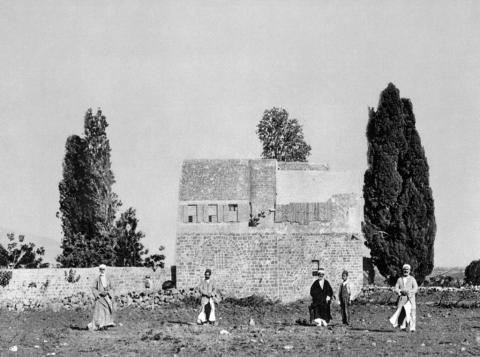Síyáh-Chál, the name of the prison to which Bahá’u’lláh was taken on that calamitous day, means the “Black Pit”. Originally a reservoir of water for one of the public baths in Tihran, it was at that time an underground dungeon in which criminals of the worst type were confined.
To reach the prison, one was taken through a pitch-black passageway and then down three steep flights of stairs. The dungeon was wrapped in thick darkness. There were no windows or outlets, other than the passage through with one entered. Nearly one hundred and fifty prisoners thieves, murderers and highwaymen were crowded into this dark, icy-cold space. The floor was covered with dirt and filth and crawling with insects. Most of the prisoners did not have clothes or even a cover to lie on. The smell was foul beyond belief.
Under these cruel conditions Bahá’u’lláh and a number of Bábís were imprisoned by the King. Bahá’u’lláh’s feet were put in stocks, and a heavy chain weighing some 50 kilograms [110 lbs.] was placed around His neck. For the first three days and nights they were given nothing to eat or drink. The family of Bahá’u’lláh would prepare food for Him and ask the guards to bring it to Him. Although at first they refused, they gradually gave in to their pleas. But, even then, no one could be sure whether the food reached Him, or whether He would accept to eat it while His fellow-prisoners went hungry.
Bahá’u’lláh and His companions, also in stocks and chains, all huddled together in one cell. They had been placed in two rows, each facing the other. Bahá’u’lláh taught them to repeat certain verses which, every night, they chanted with great fervor. “God is sufficient unto me: He verily is the All-sufficing,” one row would chant, and the other would reply: “In Him let the trusting trust.” Into the early hours of the morning, the chorus of their happy voices could be heard. So strong was their melody that it reached the ears of the King, whose palace was not far from the Siyah-Chal. “What means this sound?” he was reported to have asked. “It is the anthem the Bábís are intoning in their prison,” was the reply. The King fell silent.
Every day, the jailors would enter the cell and would call out the name of one of the Bábís, ordering him to arise and follow them to the foot of the gallows. With eagerness, the owner of the name would respond to that call. His chains removed, he would jump to his feet and, in a state of uncontrollable delight, would approach Bahá’u’lláh and embrace Him. He would then embrace each of his fellow-prisoners and would go forth, with a heart filled with hope and joy, to meet the death that awaited him. Soon after the martyrdom of each of these heroic souls, the executioner, who had grown to admire Bahá’u’lláh, would come to Him and would inform Him of the circumstances of the death of the martyr and of the joy with which he had endured, to the very end, the pain inflicted upon him.
